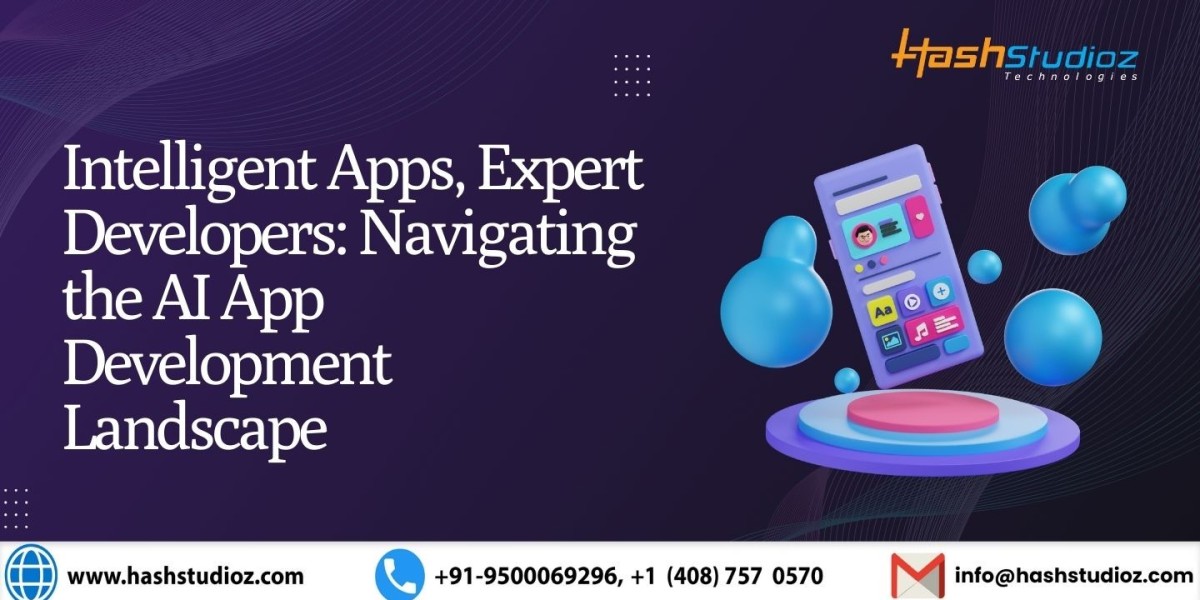Artificial Intelligence (AI) has become a revolutionary force in the rapidly changing technology landscape, redefining industries and transforming the way we engage with digital applications. AI-powered intelligent apps are becoming more and more common. They have a lot of features that improve user experiences, expedite procedures, and give unmatched insights. This piece explores the complexities of developing AI apps and the role that knowledgeable developers have in navigating this ever-changing field.
I. The Rise of Intelligent Apps
1.1 Understanding Intelligent Apps:
Intelligent apps, commonly referred to as AI-powered applications, leverage machine learning algorithms, natural language processing, and other AI technologies to deliver advanced functionalities. These applications can adapt, learn, and evolve based on user interactions, making them highly dynamic and responsive.
1.2 Key Features of Intelligent Apps:
Machine Learning Integration: Intelligent apps often employ machine learning models to analyze patterns, make predictions, and improve decision-making.
Natural Language Processing (NLP): NLP enables apps to understand and interpret human language, facilitating seamless communication between users and applications.
Predictive Analytics: These apps utilize predictive models to forecast trends, behaviors, and outcomes, aiding in proactive decision-making.
II. The AI App Development Process
2.1 Planning and Ideation:
Identifying Use Cases: Developers must meticulously identify and define the use cases for AI integration, ensuring alignment with the app's objectives.
Data Collection and Preprocessing: The success of AI applications often hinges on the quality of data. Developers need to collect, clean, and preprocess data to train robust machine learning models.
2.2 Choosing the Right Frameworks and Tools:
TensorFlow and PyTorch: Popular deep learning frameworks that empower developers to build and train sophisticated neural networks.
Scikit-Learn: A versatile machine learning library for various tasks, including classification, regression, clustering, and dimensionality reduction.
2.3 Model Development and Training:
Algorithm Selection: Depending on the application's requirements, developers must choose appropriate algorithms for training models.
Hyperparameter Tuning: Fine-tuning model parameters is crucial for optimizing performance.
2.4 Integration with Existing Systems:
APIs and SDKs: Developers integrate AI functionalities seamlessly by utilizing Application Programming Interfaces (APIs) and Software Development Kits (SDKs).
III. Challenges in AI App Development
3.1 Data Privacy and Security:
Ethical Considerations: As AI apps often deal with sensitive data, developers must prioritize ethical considerations, ensuring user privacy and security.
Data Protection Regulations: Compliance with data protection regulations such as GDPR is imperative, influencing the design and development process.
3.2 Explainability and Transparency:
Black-Box Models: Many AI models operate as black boxes, making it challenging to explain their decisions. Developers must strive for transparency in model behavior.
3.3 Continuous Learning and Adaptation:
Dynamic Environments: AI apps need to adapt to changing environments and user behaviors. Continuous learning mechanisms must be implemented to ensure sustained relevance.
IV. The Role of Expert Developers in AI App Development
4.1 Technical Proficiency:
Programming Languages: Expert developers are proficient in languages like Python, Java, and R, crucial for implementing AI algorithms.
Deep Learning Expertise: In-depth knowledge of deep learning concepts and frameworks enhances the capability to build and optimize neural networks.
4.2 Problem-Solving Skills:
Algorithmic Thinking: Expert developers possess strong algorithmic thinking, enabling them to devise efficient solutions to complex problems.
Optimization Techniques: Optimization skills are vital for fine-tuning models and ensuring optimal performance.
4.3 Collaboration and Communication:
Cross-Functional Collaboration: AI app development often involves collaboration with data scientists, domain experts, and UX designers. Effective communication is essential for seamless integration.
4.4 Keeping Abreast of Advancements:
Continuous Learning: The AI landscape is dynamic, with rapid advancements. Expert developers stay updated with the latest trends and innovations to deliver cutting-edge solutions.
V. Future Trends in AI App Development
5.1 Edge AI:
Decentralized Processing: Edge AI involves processing data locally on devices, reducing latency and enhancing privacy.
IoT Integration: The combination of Edge AI and the Internet of Things (IoT) leads to the development of intelligent, autonomous devices.
5.2 Explainable AI (XAI):
Interpretable Models: XAI focuses on making AI models more interpretable, addressing concerns related to transparency and accountability.
5.3 AI Democratization:
Low-Code and No-Code Platforms: Efforts to democratize AI aim to make it accessible to non-developers through user-friendly platforms, lowering the barrier to entry.
VI. Ethical Considerations in AI App Development
6.1 Bias and Fairness:
Algorithmic Bias: Developers must actively address and mitigate biases in AI models to ensure fair and unbiased outcomes.
Diverse Training Data: Incorporating diverse datasets helps prevent the perpetuation of existing biases and ensures a more inclusive AI application.
6.2 Responsible AI Usage:
Ethical Decision-Making: Developers play a crucial role in embedding ethical considerations into AI models, ensuring responsible decision-making.
User Consent and Control: Transparent communication with users regarding data usage and providing control over their information is essential for building trust.
6.3 Accountability and Liability:
Legal Compliance: Developers must be cognizant of legal frameworks and standards to ensure accountability in case of any unforeseen consequences.
Explainability: Creating models that are explainable and understandable ensures accountability and helps in tracing the decision-making process.
VII. Real-world Applications of Intelligent Apps
7.1 Healthcare:
Disease Prediction: AI-powered apps can analyze medical data to predict diseases, enabling early intervention and personalized treatment plans.
Diagnostic Assistance: Image recognition and natural language processing aid in diagnostic processes, enhancing the accuracy of medical diagnoses.
7.2 Finance:
Fraud Detection: Intelligent apps can analyze transaction patterns in real-time, flagging potential fraudulent activities and bolstering security.
Algorithmic Trading: AI algorithms analyze market trends and execute trades, optimizing investment strategies.
7.3 Education:
Personalized Learning: AI applications tailor educational content based on individual learning styles and progress, fostering a personalized learning experience.
Student Performance Prediction: Predictive analytics helps identify students at risk of falling behind, enabling timely interventions.
VIII. Overcoming Common Development Challenges
8.1 Limited Access to Quality Data:
Data Augmentation: Developers can employ techniques such as data augmentation to artificially expand datasets and improve model robustness.
Collaboration with Data Experts: Working closely with data scientists ensures the availability of high-quality, relevant data.
8.2 Integration Complexity:
Modular Development: Breaking down the development process into modular components eases integration and enhances flexibility.
API Standardization: Following established API standards simplifies the integration of AI functionalities into existing systems.
8.3 High Development Costs:
Open-source Tools: Leveraging open-source tools and libraries can significantly reduce development costs.
Cloud Services: Utilizing cloud-based services for AI development can provide cost-effective infrastructure and resources.
IX. The Importance of User Experience in Intelligent Apps
9.1 Intuitive Design:
User-Centric Approach: Developers must prioritize user experience, ensuring that AI features seamlessly integrate into the overall design of the application.
User Feedback Integration: Continuous user feedback helps refine AI algorithms and enhance the overall user experience.
9.2 Transparency and Trust:
Explanatory Interfaces: Designing interfaces that explain AI-driven functionalities fosters user trust and comprehension.
Clear Communication: Transparent communication about how AI is used in the app builds trust with users.
X. The Road Ahead: Evolving Trends and Possibilities
10.1 Quantum Computing:
Unprecedented Processing Power: Quantum computing has the potential to revolutionize AI by solving complex problems at speeds unattainable with classical computers.
Algorithmic Advances: The intersection of quantum computing and AI is expected to lead to the development of more powerful algorithms.
10.2 Human-Machine Collaboration:
Augmented Intelligence: The future involves a collaborative approach where AI augments human capabilities, leading to more effective and efficient outcomes.
AI as a Creative Partner: AI tools can assist in creative processes, such as content generation and design, working in harmony with human creativity.
Conclusion:
As intelligent apps continue to redefine the digital landscape, the role of expert developers becomes increasingly pivotal. Navigating the AI app development landscape requires a combination of technical prowess, problem-solving skills, and a commitment to staying abreast of advancements. As we look towards the future, the fusion of AI technologies with app development holds the promise of creating smarter, more intuitive, and ethically sound applications that cater to the evolving needs of users and industries.








